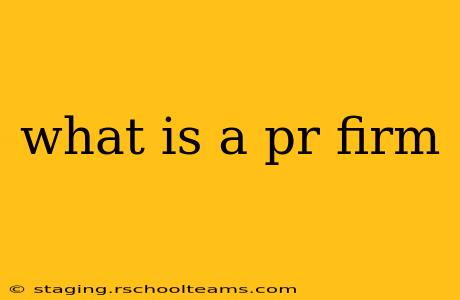Public relations (PR) is crucial for any organization aiming to build a strong reputation and connect with its target audience. But managing PR effectively requires expertise, resources, and often, a dedicated team. This is where a PR firm comes in. A PR firm, or public relations agency, is a specialized business that provides communication strategies and services to help clients cultivate a positive public image and achieve their communication goals. They act as the intermediary between their clients and the public, shaping narratives and managing how the client is perceived.
What Services Do PR Firms Offer?
PR firms offer a wide array of services tailored to meet the specific needs of their clients. These can include:
-
Media Relations: This is a core function, involving building relationships with journalists and media outlets to secure positive coverage for the client. This can include writing press releases, pitching stories, and managing media inquiries.
-
Crisis Communication: When a negative event impacts a client's reputation, a PR firm steps in to manage the fallout, crafting effective communication strategies to mitigate damage and restore public trust.
-
Reputation Management: This involves actively shaping and protecting the client's image through various communication channels. This includes monitoring online mentions, addressing negative feedback, and proactively promoting positive stories.
-
Social Media Management: PR firms utilize social media platforms to engage audiences, build communities, and enhance brand awareness. They create content calendars, manage social media accounts, and monitor online conversations.
-
Content Creation: Producing high-quality content—from press releases and blog posts to website copy and video scripts—is a key service. This content is strategically designed to communicate the client's message effectively.
-
Event Planning: PR firms can organize and manage events such as press conferences, product launches, and industry conferences, providing logistical support and ensuring successful execution.
-
Investor Relations: For publicly traded companies, PR firms can help manage communications with investors and financial analysts.
-
Public Affairs: This focuses on engaging with government officials and policymakers to influence public policy and legislation.
What are the Benefits of Hiring a PR Firm?
Hiring a PR firm offers several advantages:
-
Expertise and Experience: PR firms employ professionals with extensive knowledge and experience in various communication strategies and media relations.
-
Objectivity and Perspective: An outside perspective can offer valuable insights and identify areas for improvement that internal teams might overlook.
-
Access to Networks: PR firms often have established relationships with journalists, influencers, and other key players in the media landscape.
-
Resource Efficiency: Outsourcing PR frees up internal resources, allowing the client to focus on core business operations.
-
Measurable Results: Reputable PR firms provide data-driven reporting and analytics, demonstrating the impact of their work.
How Do PR Firms Charge for Their Services?
Pricing structures for PR firms vary considerably. Common methods include:
-
Project-based fees: A fixed fee for specific projects, such as a product launch or crisis communication management.
-
Hourly rates: Charges based on the number of hours spent working on the client's account.
-
Retainer fees: A monthly or annual fee for ongoing PR support and services.
How to Choose the Right PR Firm?
Selecting the right PR firm requires careful consideration. Look for:
- Relevant experience: Choose a firm with a proven track record of success in your industry.
- Strong client portfolio: Review their previous clients and the results they achieved.
- Clear communication: Ensure the firm communicates effectively and responds promptly to your inquiries.
- Defined strategies and measurable goals: Make sure they have a clear plan for achieving your objectives.
What is the difference between a PR firm and a marketing agency?
While there's overlap, PR and marketing are distinct disciplines. Marketing focuses on promoting products or services to drive sales, using tactics like advertising, social media marketing, and SEO. PR, conversely, focuses on building and protecting reputation, managing relationships with stakeholders, and influencing public perception. While they often work together, they have different goals and strategies.
What types of companies use PR firms?
Almost any organization can benefit from PR services. Common clients include:
- Startups: To build brand awareness and attract investors.
- Nonprofits: To raise funds and advocate for their cause.
- Large corporations: To manage their public image and address crises.
- Small businesses: To reach new customers and establish credibility.
By understanding the role and functions of a PR firm, businesses can make informed decisions about whether to utilize their services to enhance their overall communication strategy and achieve their goals.
